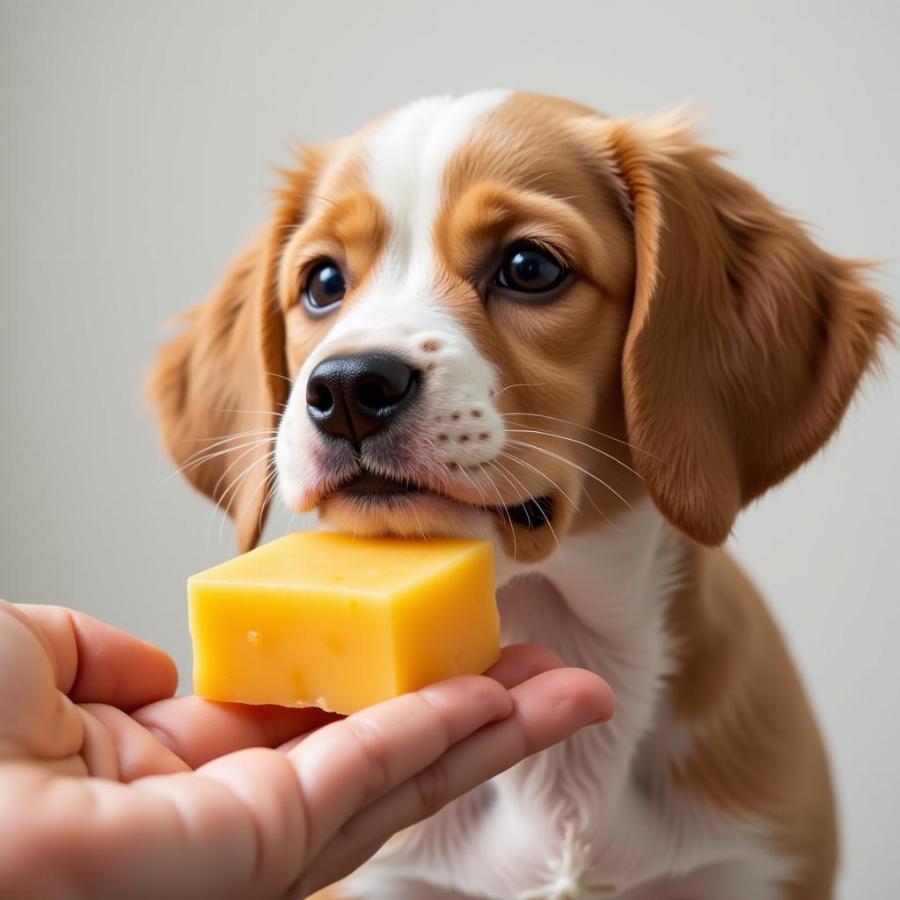Sharp cheddar cheese, with its tangy and rich flavor, is a favorite for many humans. But when our furry friends give us those pleading eyes, it’s natural to wonder, “Can I share this with my dog?” The answer isn’t a simple yes or no. While a small amount of sharp cheddar cheese isn’t usually toxic to dogs, it’s not necessarily the best treat for them. This article will dive into the details of feeding cheddar cheese to your dog, covering the potential benefits and risks, as well as safer alternatives.
Cheese, including sharp cheddar, contains lactose. Many dogs are lactose intolerant, meaning they lack the enzyme lactase needed to break down lactose properly. This can lead to digestive upset, including symptoms like diarrhea, vomiting, gas, and abdominal pain. Sharp cheddar also tends to be higher in fat than milder cheeses, which can contribute to weight gain and pancreatitis in dogs, a serious and potentially life-threatening inflammation of the pancreas.
Is Cheddar Cheese Ever Okay for Dogs?
While sharp cheddar isn’t ideal, a tiny sliver as an occasional treat might not cause problems for a dog without lactose intolerance. However, it’s crucial to monitor your dog for any signs of digestive upset after they consume cheese. If you notice any issues, discontinue giving them cheese and consult your vet.
Healthier Alternatives to Sharp Cheddar
There are plenty of dog-friendly treats that are healthier and less likely to cause digestive issues. These include:
- Fruits and vegetables: Apples (without the core and seeds), bananas, carrots, and blueberries are healthy and delicious options for dogs.
- Plain cooked chicken or turkey: These lean protein sources are great for training treats or as a special snack.
- Commercial dog treats: Look for treats specifically formulated for dogs, with limited ingredients and no artificial flavors or colors.
Can Puppies Have Sharp Cheddar Cheese?
Puppies are even more sensitive to lactose than adult dogs. It’s best to avoid giving them sharp cheddar altogether. Their digestive systems are still developing, and the high fat and lactose content can easily upset their stomachs. Stick to puppy-specific foods and treats to ensure they get the nutrients they need for healthy growth.
 Puppy looking longingly at a piece of cheddar cheese
Puppy looking longingly at a piece of cheddar cheese
What if My Dog Ate a Large Amount of Sharp Cheddar?
If your dog has consumed a large amount of sharp cheddar, contact your veterinarian immediately. They can advise you on the best course of action based on your dog’s size, breed, and health history. Symptoms to watch for include vomiting, diarrhea, lethargy, and abdominal pain.
Is All Cheese Bad for Dogs?
Not all cheese is created equal. Some cheeses, like cottage cheese and mozzarella, are lower in lactose and fat than sharp cheddar. However, even these cheeses should be given in moderation. Always consult your veterinarian before introducing any new foods into your dog’s diet.
How Can I Tell if My Dog is Lactose Intolerant?
If your dog shows signs of digestive upset after consuming dairy products, such as vomiting, diarrhea, or excessive gas, they may be lactose intolerant. A vet can confirm this through testing.
Can Dogs Have Steak Bones or Cooked Pork Bones?
While cheese can be a questionable treat, some other foods are downright dangerous for dogs. Avoid giving your dog steak bones for dogs as they can splinter and cause internal injuries. Similarly, can dogs eat pork bones cooked? Absolutely not! Cooked pork bones are even more prone to splintering than steak bones.
Conclusion
While a small sliver of sharp cheddar cheese might not harm some dogs, it’s generally best to avoid it. The potential for digestive upset and other health issues outweighs any perceived benefit. Opt for healthier alternatives like fruits, vegetables, lean meats, or dog-specific treats. Always consult your veterinarian before introducing any new food to your dog’s diet to ensure it’s safe and appropriate.
FAQ
- What should I do if my dog accidentally eats sharp cheddar cheese? Monitor them for any digestive upset and contact your vet if they show any signs of illness.
- Are there any types of cheese that are safe for dogs? Cottage cheese and mozzarella are lower in lactose and fat, but should still be given sparingly.
- What are some healthy alternatives to cheese for dogs? Fruits, vegetables, lean meats, and commercial dog treats are good options.
- Can puppies have cheese? It’s best to avoid giving cheese to puppies due to their sensitive digestive systems.
- How can I tell if my dog is lactose intolerant? Look for signs of digestive upset, such as vomiting, diarrhea, or gas, after consuming dairy products.
- Is sharp cheddar cheese toxic to dogs? While not typically toxic in small amounts, it can cause digestive problems and contribute to long-term health issues.
- What are the signs of pancreatitis in dogs? Symptoms include vomiting, diarrhea, loss of appetite, lethargy, and abdominal pain.
Other Questions You Might Have:
- Are there any other human foods that are dangerous for dogs?
- What are the best training treats for dogs?
- How can I help my dog maintain a healthy weight?
Beaut Dogs is your one-stop resource for all things related to dog care. We provide reliable, helpful, and in-depth information about the wonderful world of dogs, including breed information, health tips, training advice, and product recommendations. When you need support, please contact Email: [email protected] to get detailed and accurate answers from Beaut Dogs. Visit https://beautdogs.com today to learn more!